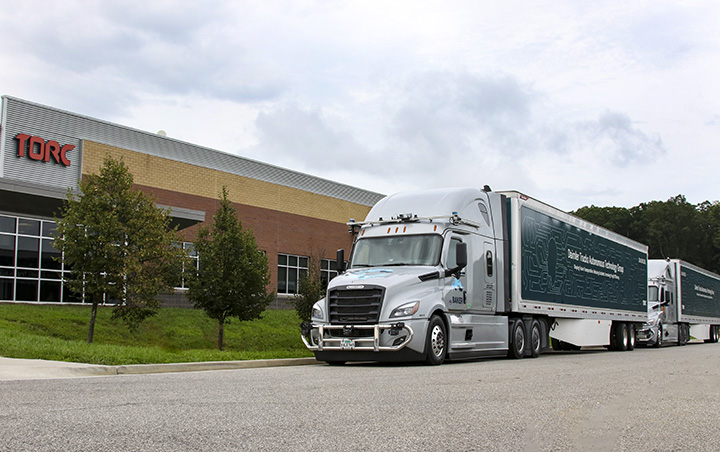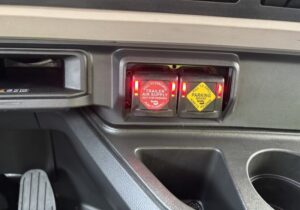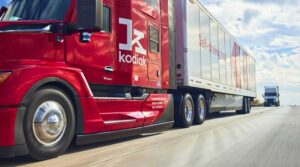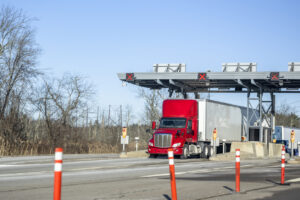STUTTGART, Germany, PORTLAND, Ore. and BLACKSBURG, Va. — September 2020 marks the one-year anniversary of a working partnership between Daimler Trucks and Torc Robotics. In September 2019, Torc Robotics joined Daimler Trucks’ Autonomous Technology Group, and the two companies have worked together toward a common goal of bringing series-produced highly automated trucks (SAE Level 4) to the roads within the decade.
The year’s achievements include on-road deployment of a Level 4 test fleet, initiation of redesign of truck chassis, adoption of a hub-to-hub model, formalized rigorous testing protocols, formal truck safety driver certification process and extended software capabilities. Now, at the one-year point, the Autonomous Technology Group will extend its testing to New Mexico with the construction of a new testing center in Albuquerque. The group anticipates that the new location will support testing and provide data for more use cases of next generation vehicles on public roads starting this fall.
“After one year of collaboration with Torc, we have successfully deployed trucks with SAE Level 4 intent technology on public roads and expanded our test fleet with trucks, miles and learnings,” said Martin Daum, chairman of the board of management for Daimler Truck AG and a member of the board of management for Daimler AG. “Partnering with Torc has created a unique and even more powerful team of innovators at Daimler Trucks. We remain fully committed to this collaboration and to focusing on the shared goal of bringing highly automated trucks to series production.”
Initial public road testing on highways began in September 2019 in southwest Virginia, where Torc is headquartered. Additionally, closed-track road testing is conducted in Madras, Oregon, at Daimler Trucks North America’s High Desert Proving Grounds. In February 2020, Daimler Trucks and Torc announced plans to expand testing of automated truck technology to additional locations, adding new public routes in the U.S.; however, the activation was postponed due to COVID-19 pandemic.
During the pandemic downtime earlier this year, the teams focused on simulation testing; then public road testing — with safety and health protocols in place — resumed in Virginia in June 2020, and will be continued with the next generation of automated driving software. The Oregon team will continue to focus on the development of vehicle safety systems, which are critical for delivering the safety standards for self-driving trucks. The goal is to refine a truck chassis that is perfectly suited for highly automated driving and includes the redundancy of systems needed to achieve safe, reliable driving, according to a statement released by Daimler Trucks.
“We have accomplished a lot during the first year. In addition to testing our technology stack on trucks on the highway in Virginia, we have scaled up our team and grown quickly — recently opening our expanded headquarters in Virginia to accommodate this growth,” said Michael Fleming, CEO of Torc Robotics. “Daimler’s commitment to safety, innovation leadership of truck technology and foundational knowledge of on-road scenarios that truckers encounter has moved our system faster than we could have done alone as a technology firm. By working with the inventor of the truck and number one truck OEM, we are convinced that Level 4 trucks can be commercialized safely with a strong business case.”
According to the U.S. Bureau of Transportation Statistics, the U.S. has seen the tonnage of goods shipped by trucks increase by 56% in the past decade. This number is expected to nearly double in the next two-and-a-half decades. These developments contribute to a growing need for safe, reliable, cost-effective trucking solutions.
Daimler Trucks has dozens of years of experience in testing and validating the durability, reliability and safety of commercial vehicles around the world. In 2019, Daimler Trucks North America unveiled the first SAE Level 2 automated truck, the Freightliner Cascadia. With Active Drive Assist (Mercedes-Benz Actros, FUSO Super Great) and Detroit Assurance 5.0 with Active Lane Assist (Freightliner Cascadia), Daimler Trucks has delivered automated driving features into series production.
Similarly, Torc has 15 years of experience in commercializing self-driving technology in heavy-duty, safety-critical applications. Moreover, Torc’s “Asimov” autonomous driving system has been tested on public roads including a cross-country journey. As a result of combining their extensive technology and testing experience, Daimler Trucks and Torc have developed a comprehensive validation approach and safety protocols for automated driving; aligned with the federal framework policy for testing and commercial deployment of SAE Level 4 automated trucks.
“We know this will not happen overnight, but with our priority and vision for safer roads and efficiencies for our customers, we are committed to the journey,” said Roger Nielsen, Daimler Trucks board member and president and CEO of Daimler Trucks North America. “We listen carefully to our customers, and we see potential to deliver commercial value to them and to society.”
All automated test drives require the combination of a safety conductor, overseeing the system, and a highly trained safety driver, certified by Daimler Trucks and Torc. All safety drivers hold commercial driver’s licenses and are specially trained in vehicle dynamics and automated systems.
“The partnership has enabled both our teams to move faster on developing Level 4 trucks, providing Daimler engineers with insights on how the technology will impact truck design, and providing Torc with data and perspective on what technology will work best for the trucking industry,” said Peter Vaughan Schmidt, head of the autonomous technology group at Daimler Trucks. “We will implement the results of our collaboration in the next phase of public road testing later this year.”
The Trucker News Staff produces engaging content for not only TheTrucker.com, but also The Trucker Newspaper, which has been serving the trucking industry for more than 30 years. With a focus on drivers, the Trucker News Staff aims to provide relevant, objective content pertaining to the trucking segment of the transportation industry. The Trucker News Staff is based in Little Rock, Arkansas.















